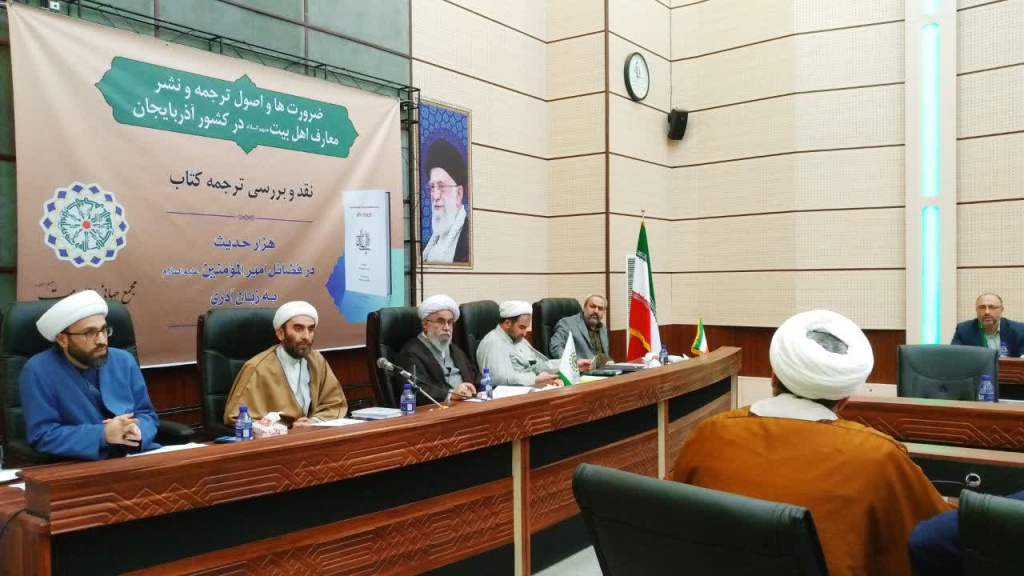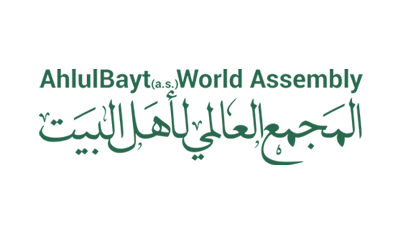There is a need to write a work about the jurists and scientific figures of the Caucasus and the Republic of Azerbaijan: Ayatollah Ramazani
The Secretary General of the AhlulBayt (a.s.) World Assembly stated, “The translator must know the semantic capacities of the words in the source and target languages well, and then choose the closest equivalents, which convey the general meaning in addition to the meaning of the word.”
ABWA Official Website – The seminar “Necessities and Principles of Translation and Publication of the AhlulBayt (a.s.) Teachings in Azerbaijan” was held on Thursday, May 4, 2023, at the AhlulBayt (a.s.) World Assembly in Qom. In this seminar, the translation of the book “A Thousand Hadiths on the Virtues of Imam Ali (a.s.)” in the Azeri language was reviewed by experts.
In this seminar, the Secretary General of the AhlulBayt (a.s.) World Assembly stated, “Holding such sessions is one of the transformative measures, and in this, the departments of Scientific and Cultural Affairs and International Affairs interact and cooperate with each other to examine the needs and priorities.”

Referring to the martyrdom anniversary of Professor Murtaza Motahari, Ayatollah Reza Ramazani said, “Martyr Motahari was one of the scholars who were aware of his time, and even ahead of his time, he wrote works as an expert in Islam, someone who knows the audience and the subject. One of his outstanding features was entering into the topics, according to the needs of society and the audience.”
“Our society and seminaries need figures like Martyr Motahari so that they can introduce AhlulBayt (a.s.) to the elites of the world,” he added.
Addressing the ulama of the Republic of Azerbaijan, the Secretary General of the AhlulBayt (a.s.) World Assembly said, “It is appropriate that one of Azerbaijani researchers write a work about prominent jurists and scientific figures of the Caucasus and the Republic of Azerbaijan. We will support the publication of such a work.”
About the propagation methods of the AhlulBayt (a.s.) school, he said “Printing books in different regions requires permission, and we should turn to digital library and digital printing. There is also a need to work on audiobooks.”
On the authorship requirements, the professor of higher levels of Qom Seminary emphasized, “There is a need to talk about the priorities and necessities of authoring works in different regions, and ulama and intellectuals should present their views on what books should be prioritized. To publish the works, it is necessary to coordinate with the Department of Scientific and Cultural Affairs, as well as the International Department of the Assembly so that we do not witness repetitive work.”
“It is necessary to turn to native translations,” he added, “In translating works, the translator must be familiar with the source language and the literature and culture of the target language.”
In another part of his speech, about the book “A Thousand Hadiths on the Virtues of Imam Ali (a.s.)”, Ayatollah Ramazani argued, “The original book is very useful and valuable. Because hadiths have been collected in it on the virtues of AhlulBayt (a.s.). But to introduce virtues, hadiths must be categorized.”
About the need to provide equivalent concepts, he said, “In the translation of some topics, the translator must know the semantic capacities of the words in the source and target languages well, and then choose the closest equivalents, which convey the general meaning in addition to the meaning of the word.”
“It is very important to pay attention to the documentation of hadiths. The discussion of the document has precise and subtle points. Because some hadiths are flawed in terms of authenticity. Also, in this regard, attention should also be paid to the arguments and concepts of hadith,” continued the professor of higher levels of Qom Seminary.
“In today’s society, the issue of “women from the perspective of AhlulBayt (a.s.)” can be studied and investigated. The Holy Prophet (p.b.u.h) and Infallible Imams (a.s.) were defenders of women’s rights. The late Motahari also strongly defended women’s rights,” he added.
“In Europe, women were persecuted and brutalized so much that laws were made for it, and even today they use women as a tool,” noted the Secretary General of the AhlulBayt (a.s.) World Assembly.
At the end of his speech, while pointing out the necessity of scientific and cultural activity, he emphasized, “Clergy and clerics have the duty to introduce the AhlulBayt (a.s.) to the elites of the world. Clarifying the culture of the Infallibles (a.s.) and answering doubts is one of the missions of the clerics of Azerbaijan.”
/345/
The Secretary General of the AhlulBayt (a.s.) World Assembly stated, “The translator must know the semantic capacities of the words in the source and target languages well, and then choose the closest equivalents, which convey the general meaning in addition to the meaning of the word.”
ABWA Official Website – The seminar “Necessities and Principles of Translation and Publication of the AhlulBayt (a.s.) Teachings in Azerbaijan” was held on Thursday, May 4, 2023, at the AhlulBayt (a.s.) World Assembly in Qom. In this seminar, the translation of the book “A Thousand Hadiths on the Virtues of Imam Ali (a.s.)” in the Azeri language was reviewed by experts.
In this seminar, the Secretary General of the AhlulBayt (a.s.) World Assembly stated, “Holding such sessions is one of the transformative measures, and in this, the departments of Scientific and Cultural Affairs and International Affairs interact and cooperate with each other to examine the needs and priorities.”

Referring to the martyrdom anniversary of Professor Murtaza Motahari, Ayatollah Reza Ramazani said, “Martyr Motahari was one of the scholars who were aware of his time, and even ahead of his time, he wrote works as an expert in Islam, someone who knows the audience and the subject. One of his outstanding features was entering into the topics, according to the needs of society and the audience.”
“Our society and seminaries need figures like Martyr Motahari so that they can introduce AhlulBayt (a.s.) to the elites of the world,” he added.
Addressing the ulama of the Republic of Azerbaijan, the Secretary General of the AhlulBayt (a.s.) World Assembly said, “It is appropriate that one of Azerbaijani researchers write a work about prominent jurists and scientific figures of the Caucasus and the Republic of Azerbaijan. We will support the publication of such a work.”
About the propagation methods of the AhlulBayt (a.s.) school, he said “Printing books in different regions requires permission, and we should turn to digital library and digital printing. There is also a need to work on audiobooks.”
On the authorship requirements, the professor of higher levels of Qom Seminary emphasized, “There is a need to talk about the priorities and necessities of authoring works in different regions, and ulama and intellectuals should present their views on what books should be prioritized. To publish the works, it is necessary to coordinate with the Department of Scientific and Cultural Affairs, as well as the International Department of the Assembly so that we do not witness repetitive work.”
“It is necessary to turn to native translations,” he added, “In translating works, the translator must be familiar with the source language and the literature and culture of the target language.”
In another part of his speech, about the book “A Thousand Hadiths on the Virtues of Imam Ali (a.s.)”, Ayatollah Ramazani argued, “The original book is very useful and valuable. Because hadiths have been collected in it on the virtues of AhlulBayt (a.s.). But to introduce virtues, hadiths must be categorized.”
About the need to provide equivalent concepts, he said, “In the translation of some topics, the translator must know the semantic capacities of the words in the source and target languages well, and then choose the closest equivalents, which convey the general meaning in addition to the meaning of the word.”
“It is very important to pay attention to the documentation of hadiths. The discussion of the document has precise and subtle points. Because some hadiths are flawed in terms of authenticity. Also, in this regard, attention should also be paid to the arguments and concepts of hadith,” continued the professor of higher levels of Qom Seminary.
“In today’s society, the issue of “women from the perspective of AhlulBayt (a.s.)” can be studied and investigated. The Holy Prophet (p.b.u.h) and Infallible Imams (a.s.) were defenders of women’s rights. The late Motahari also strongly defended women’s rights,” he added.
“In Europe, women were persecuted and brutalized so much that laws were made for it, and even today they use women as a tool,” noted the Secretary General of the AhlulBayt (a.s.) World Assembly.
At the end of his speech, while pointing out the necessity of scientific and cultural activity, he emphasized, “Clergy and clerics have the duty to introduce the AhlulBayt (a.s.) to the elites of the world. Clarifying the culture of the Infallibles (a.s.) and answering doubts is one of the missions of the clerics of Azerbaijan.”
/345/





